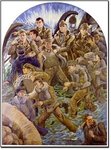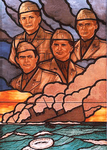syscom3
Pacific Historian
While posting my U-Boat activites for this date, I discovered that Feb 3rd was the 65th anniversary of this event. I know one thing.... anyone who can stay on a sinking ship while helping others to their safety knowing they will soon be lost, must have a type of courage no one can know.
...The altruistic action of the four chaplains constitutes one of the purest spiritual and ethical acts a person can make. When giving their life jackets, Rabbi Goode did not call out for a Jew; Father Washington did not call out for a Catholic; nor did the Reverends Fox and Poling call out for a Protestant. They simply gave their life jackets to the next man in line.....
:: The Four Chaplains Memorial Foundation ::
It was the evening of Feb. 2, 1943, and the U.S.A.T. Dorchester was crowded to capacity, carrying 902 service men, merchant seamen and civilian workers.
Once a luxury coastal liner, the 5,649-ton vessel had been converted into an Army transport ship. The Dorchester, one of three ships in the SG-19 convoy, was moving steadily across the icy waters from Newfoundland toward an American base in Greenland. SG-19 was escorted by Coast Guard Cutters Tampa, Escanaba and Comanche.
Hans J. Danielsen, the ship's captain, was concerned and cautious. Earlier the Tampa had detected a submarine with its sonar. Danielsen knew he was in dangerous waters even before he got the alarming information. German U-boats were constantly prowling these vital sea lanes, and several ships had already been blasted and sunk.
The Dorchester was now only 150 miles from its destination, but the captain ordered the men to sleep in their clothing and keep life jackets on. Many soldiers sleeping deep in the ship's hold disregarded the order because of the engine's heat. Others ignored it because the life jackets were uncomfortable.
On Feb. 3, at 12:55 a.m., a periscope broke the chilly Atlantic waters. Through the cross hairs, an officer aboard the German submarine U-223 spotted the Dorchester.
The U-223 approached the convoy on the surface, and after identifying and targeting the ship, he gave orders to fire the torpedoes, a fan of three were fired. The one that hit was decisive--and deadly--striking the starboard side, amid ship, far below the water line.
Danielsen, alerted that the Dorchester was taking water rapidly and sinking, gave the order to abandon ship. In less than 20 minutes, the Dorchester would slip beneath the Atlantic's icy waters.
Tragically, the hit had knocked out power and radio contact with the three escort ships. The CGC Comanche, however, saw the flash of the explosion. It responded and then rescued 97 survivors. The CGC Escanaba circled the Dorchester, rescuing an additional 132 survivors. The third cutter, CGC Tampa, continued on, escorting the remaining two ships
.
Aboard the Dorchester, panic and chaos had set in. The blast had killed scores of men, and many more were seriously wounded. Others, stunned by the explosion were groping in the darkness. Those sleeping without clothing rushed topside where they were confronted first by a blast of icy Arctic air and then by the knowledge that death awaited.
Men jumped from the ship into lifeboats, over-crowding them to the point of capsizing, according to eyewitnesses. Other rafts, tossed into the Atlantic, drifted away before soldiers could get in them.
Through the pandemonium, according to those present, four Army chaplains brought hope in despair and light in darkness. Those chaplains were Lt. George L. Fox, Methodist; Lt. Alexander D. Goode, Jewish; Lt. John P. Washington, Roman Catholic; and Lt. Clark V. Poling, Dutch Reformed.
Quickly and quietly, the four chaplains spread out among the soldiers. There they tried to calm the frightened, tend the wounded and guide the disoriented toward safety.
"Witnesses of that terrible night remember hearing the four men offer prayers for the dying and encouragement for those who would live," says Wyatt R. Fox, son of Reverend Fox.
One witness, Private William B. Bednar, found himself floating in oil-smeared water surrounded by dead bodies and debris. "I could hear men crying, pleading, praying," Bednar recalls. "I could also hear the chaplains preaching courage. Their voices were the only thing that kept me going."
Another sailor, Petty Officer John J. Mahoney, tried to reenter his cabin but Rabbi Goode stopped him. Mahoney, concerned about the cold Arctic air, explained he had forgotten his gloves.
"Never mind," Goode responded. "I have two pairs." The rabbi then gave the petty officer his own gloves. In retrospect, Mahoney realized that Rabbi Goode was not conveniently carrying two pairs of gloves, and that the rabbi had decided not to leave the Dorchester.
By this time, most of the men were topside, and the chaplains opened a storage locker and began distributing life jackets. It was then that Engineer Grady Clark witnessed an astonishing sight.
When there were no more lifejackets in the storage room, the chaplains removed theirs and gave them to four frightened young men.
"It was the finest thing I have seen or hope to see this side of heaven," said John Ladd, another survivor who saw the chaplains' selfless act.
Ladd's response is understandable. The altruistic action of the four chaplains constitutes one of the purest spiritual and ethical acts a person can make. When giving their life jackets, Rabbi Goode did not call out for a Jew; Father Washington did not call out for a Catholic; nor did the Reverends Fox and Poling call out for a Protestant. They simply gave their life jackets to the next man in line.
As the ship went down, survivors in nearby rafts could see the four chaplains--arms linked and braced against the slanting deck. Their voices could also be heard offering prayers.
Of the 902 men aboard the U.S.A.T. Dorchester, 672 died, leaving 230 survivors. When the news reached American shores, the nation was stunned by the magnitude of the tragedy and heroic conduct of the four chaplains.
"Valor is a gift," Carl Sandburg once said. "Those having it never know for sure whether they have it until the test comes."
That night Reverend Fox, Rabbi Goode, Reverend Poling and Father Washington passed life's ultimate test. In doing so, they became an enduring example of extraordinary faith, courage and selflessness.
The Distinguished Service Cross and Purple Heart were awarded posthumously December 19, 1944, to the next of kin by Lt. Gen. Brehon B. Somervell, Commanding General of the Army Service Forces, in a ceremony at the post chapel at Fort Myer, VA.
A one-time only posthumous Special Medal for Heroism was authorized by Congress and awarded by the President Eisenhower on January 18, 1961. Congress attempted to confer the Medal of Honor but was blocked by the stringent requirements that required heroism performed under fire. The special medal was intended to have the same weight and importance as the Medal of Honor.



